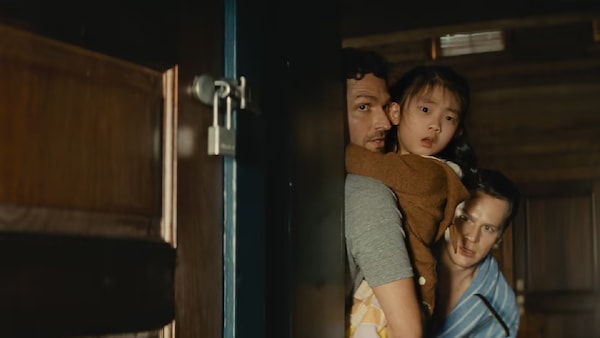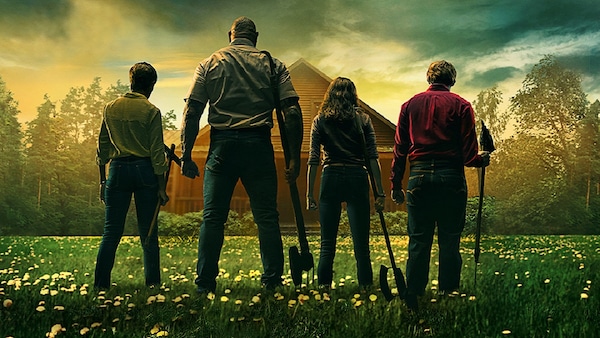M Night Shyamalan's Knock At The Cabin Isn't Your Typical Home Invasion Thriller
This is #CineFile, where our critic Rahul Desai goes beyond the obvious takes, to dissect movies and shows that are in the news. Here: M Night Shyamalan's Knock At The Cabin.

Last Updated: 12.57 PM, Feb 04, 2023
THE SUSPENSE OF the latest M Night Shyamalan film is rooted in the identity of its genre. Three of the seven characters believe that they are trapped in a conventional story. A gay couple — Eric and Andrew — and their adopted Chinese-American daughter, Wen, are vacationing at a remote cabin in the American countryside. Four strangers — gentle giant and schoolteacher Leonard, nurse Sabrina, line cook Adriane and a nervy Redmond — show up with makeshift weapons and hold them hostage. Their motives aren’t clear. The couple’s biggest conflict, though, isn’t that they are in mortal danger with their child. It’s that Knock At The Cabin isn’t the simple home-invasion thriller it sounds like.
The four attackers aren’t actually attacking them. They’re strangely polite and apologetic. It’s almost like they’re refusing to engage with who we — and the family — expect them to be. They don’t behave like they’re ‘supposed’ to. Instead, they go on about Visions and Chosen Ones and skies falling and plagues, and how the family must sacrifice one of their own to save the planet from Judgment Day. If the family refuses, they threaten to conduct a similar ritual on themselves. Everything about the intruders suggests that they’re Bible Nuts channeling the homophobia of Christian scriptures. It comes to a point where the family almost hopes that this is all they are. They hope that the four strangers are merely deluded souls looking for ways to rationalise the world’s nuances. In other words, they hope that Knock At The Cabin isn’t some twisted apocalyptic drama.
Andrew — a lawyer and the hotheaded one — dismisses the strangers’ theories as any sane adult would; logic is his refuge. But Eric, the softer and more religious partner, wonders if there is more to what these attackers are claiming; faith is his escape. Even though violence and a fair bit of Shyamalisms are involved, the diverging beliefs of the two partners about the intruders bring to mind the premise of Jerome Bixby’s The Man from Earth. The 2007 indie cult classic — based on a farewell party for a professor who tries to convince his colleagues that he’s a popular divine figure who has lived for centuries — thrived on keeping its viewers in the dark about its genre, too: Science-fiction drama or conversational thriller? Is the professor pranking his friends or is he (Godforbid) telling the truth? Shyamalan plays similar mind games with his audience, offering evidence of both pragmatism and idealism, small and big. There’s live television footage of plagues and plane crashes and tsunamis, but there’s also Andrew’s Democrat-like aggression cutting through the intruders’ distinctly Republican values. One of the four is also revealed to be a bit of an imposter.

The answer, of course, is less about the relationship between life and religion than it is about a spiritual indictment of this doomsday era. The implication might be that we are already in the midst of a modern apocalypse — pandemics, climate change, wars, riots, inflation — and the only hope is to atone for our sins and start afresh. The implication is also that the only way to leave a better world for our children is to react to all the doom-scrolling — no matter how crazy it sounds — instead of trivialising it. The end is so near that the beginning makes sense.
Shyamalan isn’t the most liberal with his college-level philosophy, but he pulls out all the old-school stops in terms of craft. He excels at tension-building, making us see the sound and hear the visuals. The way he moves the camera towards faces and away from bodies tells its own story; it goes a long way in composing a film where thoughts keep filling in for actions, and intuition keeps replacing perception. For stubborn Shyamalan enthusiasts like myself, his Hitchcockian techniques feel vintage in a way Tom Cruise does in Top Gun: Maverick; elaborately lit shots of inanimate objects and doors and walls still express the inherent horrors of living. There’s a genuine sense of curiosity about spaces and their inextricable link to human nature.
Knock At The Cabin is not the first time the director has upended our notion of genre. Most of his movies — with different degrees of success — deconstruct the bridge between the natural and the supernatural, between faith and fate: The Sixth Sense, Signs, The Village, Lady in the Water, The Happening, Old. More importantly, they feature ordinary protagonists who grapple with the burden — and the consequences — of the extraordinary. It’s why his Unbreakable series (Unbreakable, Split, Glass) is perhaps the most original superhero trilogy ever made. By making a case for brokenness being a more evolved state of being — a superpower of sorts — it introduces a newer and more novel way to view the seemingly conservative politics of films like Knock At The Cabin. At the end of the day, it’s also a superhero premise that doesn’t know it’s one yet: The destiny of humankind rests in the hands of a gay couple and their adopted daughter. Each of them has faced rejection and cruelty from society — homophobic parents, bar attacks, social stigma. Just as it took the lunacy of comic-book fanatic Elijah Price to uncover the dormant presence of someone like David Dunn, maybe it takes four Bible fanatics to uncover the dormant powers of advanced familyhood. It’s no coincidence that this “unnatural” family is selected for the purity of their bond. Love is, after all, the only thing that makes the world go round.
